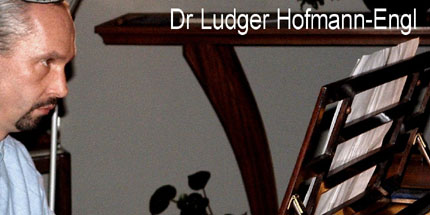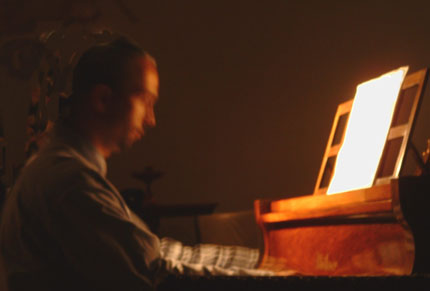|

Although noted for
world-class performances at our very own Fairfield Halls,
Croydon isn’t exactly famous for the number of artists
actually producing music in our philistine’s playground of a
borough. It was
across the road from Fairfield, however, that we went to see
one of Croydon’s major new talents perform some of his work.
Dr Ludger Hofmann-Engl was
giving a piano recital at the Unitarian Church in Croydon just
before Christmas. We already knew Ludger gave piano lessons,
( http://www.croyweb.com/Basic/Music/musictuition.htm
), but beyond this we knew not a lot.
Grateful for a night off from Christmas shopping we
braved the winter night and the Croydon traffic to find out
more.
Ludger studied composition at the Nuremberg Conservatory and
was instructed in Piano at the Sacred Music Institute Erlangen
and in Berlin, completing his PhD in 2003 in Music Psychology
at Keele University. He has pursued the psychological side of music having written
many articles on the subject and talked at international
conferences around the world.
The venue, although small,
is ideal for this kind of event and for the size of the
audience, which had been limited to family, friends,
colleagues and former pupils. The atmosphere was
informal and relaxed, several children were sitting near the
front and from our experience of piano performances this was
going to be hard going for them. We soon realised this
was not going to be a concern due to the punchy format, as
well as the variety and length of the concert.
The concert was arranged into two sections either side of the
interval with an example of a Fantasia by Mozart in the first,
followed by three Chopin Waltzes in the second session.
Following each composer’s piece, Ludger then played an
equivalent composition from his own catalogue of work. A
catalogue that now numbers over fifty compositions played by
orchestras across Europe for broadcast on radio and released
on Cd, with more coming up in 2004.
More self-indulgent musicians would just play own material,
but by interspersing his own works with those of Mozart and
Chopin he created a variety that was kind to the 21st century
attention span of some listeners (namely the staff of
Croyweb).

Between
pieces, taking the applause, Ludger literally beamed sunlight
into the room, he was obviously really enjoying himself.
A man very much at ease with himself, in love with his wife
and family, and not least his music.
The
programme contained references to Ludger’s method of
composing which comprised exploring the psychological impact
of cognitive experiences thereby creating complex musical
structures in accordance with life events. We were too
polite to ask exactly what all this meant and it remained a
mystery until the full impact was dramatically brought home
during the opening piece.
In
a departure from the programme he played a piece he’d
written for his wife. It consisted of four sections
covering the main stages of their relationship. Much to
the obvious embarrassment of his wife Nicky he played the
second section – “Troubles”. It was staggeringly
powerful and not a little tortured. Without completely
understanding how it was happening one could sense a huge
feeling behind the music and a communication of something
rather awe inspiring. We were assured later that the
piece really was based on their life experience of each other,
which left us wondering how these two people were still
together, although happily the composition ends in a
section called "Unity". So the idea was that the
process of growing together is not always smooth but contains
painful moments, which - if both parties try hard enough -
will eventually be overcome.
In
another twist to the programme was Ludger ended with
Chopin’s Mazurka Opus 68.4, an unfinished piece found beside
the composer’s deathbed. The haunting and beautiful
melody was played to perfection by Ludger and with due
reverence he decided to loop the music therefore not imposing
an ending of his own. The audience were invited to leave
during the piece that was then gently phased out after
everyone had left the hall.
The
style of ending also avoided the need for an ovation from
the appreciative audience. In characteristic form he
emerged casually from the hall into the foyer after several
minutes to the enthusiastic applause of the still waiting
audience who weren’t going anywhere until we’d shown the appreciation
the performance so rightly deserved.

|
